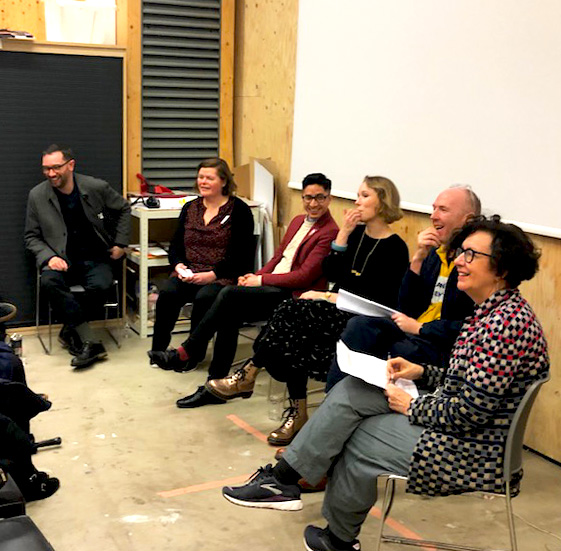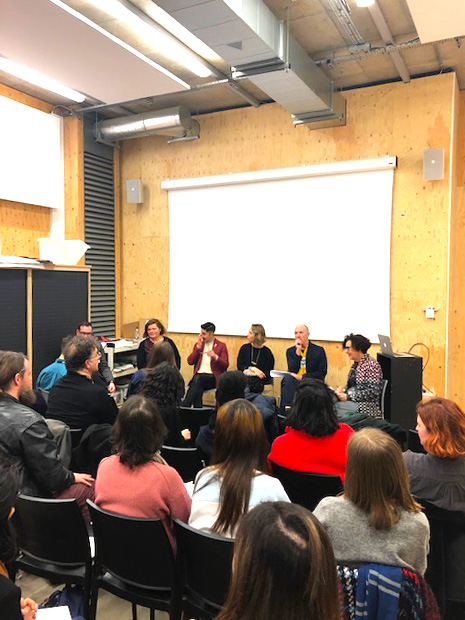
MA Narrative Environments recently hosted a ‘Designing Narrative Environments for Critical Heritage’ event in collaboration with UCL Institute of Archaeology, devised and produced by MANE Course Leader Tricia Austin and Colin Sterling, AHRC Leadership Fellow at UCL.

Cross disciplinary speakers and guests cast a critical eye on the important role of museums, heritage sites and other historical environments in working through contested pasts and difficult narratives. The evening showed how design has a crucial part to play in diversifying and complicating the narratives, experiences and histories found within and across the heritage sector.
The event aimed to explore the different ways in which curators, historians, conservators and other heritage professionals might work with designers to confront the politics of history and memory today.

The speakers included:
Tamsin Silvey
Tamsin has worked at Historic England as Cultural Programme Curator since 2015. Most recently she co-curated What Remains at IWM London, and worked on Where Light Falls, a light installation project at St Paul’s and Coventry cathedrals. She is also a PhD researcher at Birkbeck interrogating how conflict photographs have been curated within temporary exhibitions at British institutions from 2010-20.
Historic England helps people care for, enjoy and celebrate England’s spectacular historic environment. Since 2015, it has been producing cultural programming, from exhibitions and events to installations and heritage days. This talk will review a number of projects that took a different approach to create events and activities that were outside the ordinary. It will focus on Historic England’s 2018 season Immortalised, that explored how, why and who England remembers in its streets, buildings and spaces, and its 2019 season Loss and Destruction, that looked at the issue of lost heritage and the importance of buildings and places to communities.
Dan Vo
Dan Vo FRSA is heritage consultant and museum freelancer. As a Victoria and Albert ambassador he founded the award-winning volunteer-led LGBTQ+tours at the museum in 2015. He has since developed similar tours for Amgueddfa Cymru National Museum Wales and University of Cambridge Museums (Fitzwilliam Museum, Polar Museum, Zoology Museum, Museum of Classical Archaeology, and Museum of Archaeology and Anthropology).
Dan work aims to identify the existence to LGBTQ+ identities and communities across place, time and culture. Sometimes coded, other times explicit, this talk begins with an exploration of objects from the past from the various collections, followed by a discussion of the implications for the present day. Then looking forward, what does queer art and design of the future look like? How could you make an impact on queer art and design?
Julie Howell
As a socially engaged artist/activist and experience designer Julie Howell creates sensory site-specific work that is both visually arresting and powerful in meaning. She is interested in the threads of lived experience that link all humanity, sourcing these within historically difficult narratives and using them to open up new ways of thinking, seeing and feeling amongst visitors.
In 2019 HumanKind opened at Calke Abbey, an ambitious, large scale installation and interpretive project installation across the house, gardens and estate at this iconic National Trust’ property. HumanKind harnessed new approaches to design to explore the role that culture could play in tackling isolation and loneliness by challenging stigma, getting people talking, fostering rich human interaction and prompting small acts of kindness. Challenging the stories that have been told at Calke for more than 30 years, HumanKind demanded new processes and practices including a collapsing of the boundaries that tend to define different team roles and an open, non-hierarchical approach to collaboration that could facilitate involvement from diverse groups. These new ways of working resulted in a radical transformation of the traditional heritage experience, offering rich and inclusive ways to experience the site.
Matt Haycocks
Matt Haycocks curates and designs photographic exhibitions, he teaches in the School of Architecture and Cities, Westminster University. His research at Central Saint Martins, UAL looks at the representation of the everyday as heritage. His practice relies on found objects/texts in particular domestic photography and its interpretation using fiction.
Heritage is not simply means to preserve object/texts but is implicated in the generation of the reality it describes. At the same time it rests on a double separation from the reality of the past: skewed by selection and through its adherence to fictional tropes and narrative structures. In this presentation Matt Haycocks will discuss the way heritage appears to privilege the given present whilst closing down other possible nows. He introduces strategies for managing absence and complexity in an experimental ‘future oriented’ heritage.